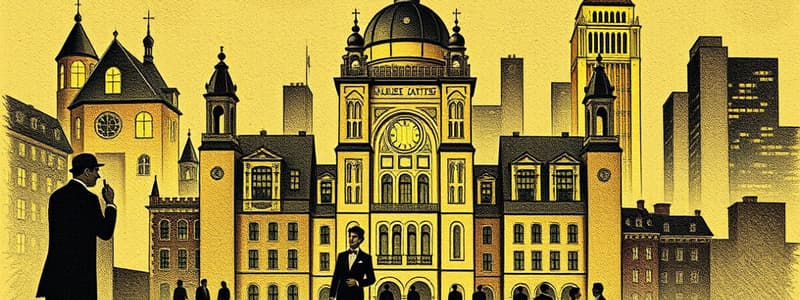Podcast
Questions and Answers
What does the word 'eddy' mean?
What does the word 'eddy' mean?
- A circular movement of air or water (correct)
- A person, animal, or plant that lives in a particular place
- To tear something into pieces
- Disagreement that causes arguments
Define 'credulity'.
Define 'credulity'.
Ability or willingness to believe something.
What does 'bona-fide' mean?
What does 'bona-fide' mean?
Real or genuine.
Define 'provincial'.
Define 'provincial'.
What does it mean to 'implore'?
What does it mean to 'implore'?
Define 'rend'.
Define 'rend'.
What does 'asunder' mean?
What does 'asunder' mean?
Define 'dissension'.
Define 'dissension'.
What does 'wayward' mean?
What does 'wayward' mean?
What does 'caterwauling' refer to?
What does 'caterwauling' refer to?
Define 'somnambulatory.'
Define 'somnambulatory.'
What does 'denizen' mean?
What does 'denizen' mean?
Define 'vestige'.
Define 'vestige'.
What literary device is used in the phrase 'In his blue gardens men and girls came and went like moths among the whisperings and the champagne and the stars'?
What literary device is used in the phrase 'In his blue gardens men and girls came and went like moths among the whisperings and the champagne and the stars'?
What literary device is demonstrated in 'A chauffeur in a uniform of robin's-egg blue crossed my lawn early that Saturday morning...'
What literary device is demonstrated in 'A chauffeur in a uniform of robin's-egg blue crossed my lawn early that Saturday morning...'
Identify the literary device in the phrase 'a young roughneck whose elaborate formality of speech just missed being absurd'.
Identify the literary device in the phrase 'a young roughneck whose elaborate formality of speech just missed being absurd'.
What literary device is used in 'Anyhow, he gives large parties... They're so intimate'?
What literary device is used in 'Anyhow, he gives large parties... They're so intimate'?
What does the phrase 'Blinded by the glare of the headlights...' use as a literary device?
What does the phrase 'Blinded by the glare of the headlights...' use as a literary device?
Identify the literary device in 'I came into her room half an hour before the bridal dinner... as drunk as a monkey'.
Identify the literary device in 'I came into her room half an hour before the bridal dinner... as drunk as a monkey'.
What literary device is used in 'Her throat, full of aching, grieving beauty, told only of her unexpected joy'?
What literary device is used in 'Her throat, full of aching, grieving beauty, told only of her unexpected joy'?
Identify the literary device in 'Recovering himself in a minute he opened for us two hulking patent cabinets... piled like bricks'.
Identify the literary device in 'Recovering himself in a minute he opened for us two hulking patent cabinets... piled like bricks'.
What does the phrase 'I tried to go then, but they wouldn't hear of it...' exemplify?
What does the phrase 'I tried to go then, but they wouldn't hear of it...' exemplify?
Study Notes
Vocabulary Terms
- Eddy: Refers to a circular movement of air or water, often creating a whirlpool effect.
- Credulity: The ability or willingness to believe something, often without thorough evidence or skepticism.
- Bona-fide: denoting something that is real or genuine, not counterfeit or fake.
- Provincial: Characterized by narrow or limited concerns, reflecting a lack of sophistication or open-mindedness.
- Implore: To ask or beg for something earnestly or desperately, often with a sense of urgency.
- Rend: To tear apart or shred violently, typically indicating a strong force or emotion.
- Asunder: Refers to something being divided or separated into parts.
- Dissension: A disagreement that disrupts harmony within a group, leading to arguments over significant issues.
- Wayward: Describes someone or something that is unpredictable or disobedient, veering from the intended path.
- Caterwauling: Making a loud, unpleasant noise, often associated with distress or annoyance.
- Somnambulatory: Pertaining to sleepwalking, indicating actions taken while in a sleep state.
- Denizen: A person, animal, or plant that inhabits or is frequently found in a specific area.
Key Figurative Language
-
Similes:
- The imagery of people coming and going in Gatsby's "blue gardens" likens them to moths, emphasizing the allure and ephemeral nature of his parties.
- Gatsby's Rolls-Royce is compared to an omnibus, illustrating its role in transporting guests during lavish gatherings.
- A bride is compared to a lovely June night, highlighting her beauty, while the phrase "as drunk as a monkey" adds humor and vivid imagery.
- An item being described as "coming to pieces like snow" underscores fragility and loss.
- Suits and shirts are piled in cabinets, compared to bricks, offering a visual of abundance and disorder.
-
Personification:
- A scene where headlights create blinding glare gives human-like qualities to inanimate objects, enhancing a sense of confusion and drama.
- Gatsby's hurried entrance in a formal attire is described in a way that conveys urgency and character.
-
Oxymorons/Paradoxes:
- An element of small parties being "intimate" yet lacking privacy contrasts common perceptions of social gatherings.
- “Aching, grieving beauty” reflects conflicting emotions, emphasizing complexity in feelings.
- The statement about making others feel "more satisfactorily alone" uncovers layers of human interaction and emotions present in social dynamics.
Additional Notes
- The use of figurative language enriches the narrative, providing depth to characters and situations.
- Vocabulary words reflect the themes of disillusionment, social status, and the complexity of human relationships present in the story.
- Understanding these terms and figures of speech enhances comprehension of character motivations and social commentary within the narrative.
Studying That Suits You
Use AI to generate personalized quizzes and flashcards to suit your learning preferences.
Description
Test your knowledge of vocabulary and figurative language from Chapters 3 to 5 of 'The Great Gatsby'. This quiz explores important words and their meanings to enhance your understanding of the text. Perfect for students who want to deepen their literary analysis skills!




